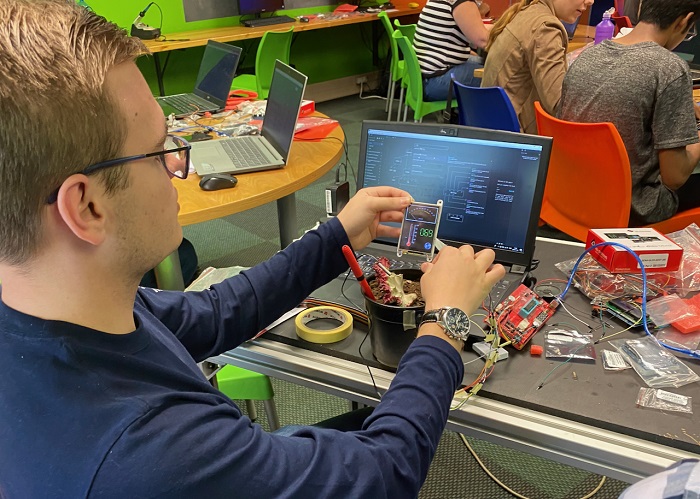Posted on November 28, 2019
What does the average biologist have to do with programming microprocessors? Everything, as it turns out.
Professor Jim Haseloff, a world-leading plant synthetic biologist at the University of Cambridge, recently presented a workshop at the University of Pretoria in which transdisciplinary teams of students and staff learned to use OpenSmart Arduino Rich Uno R3 kits and low-cost sensors and devices to build DIY bioinstruments, sensors or hardware for various practical applications in the biological and related fields. The workshop was coordinated by Dr Steven Hussey, a Senior Lecturer in the Faculty of Natural and Agricultural Sciences’ Department of Biochemistry, Genetics and Microbiology.

Biomaker workshop participants try out XOD graphical programming tutorials with their Arduino Rich UNO R3 starter kits.
This is the vision of an exciting initiative funded by the UK’s Global Challenges Research Fund (GCRF) to build capacity in practical applications of open-source environmental sensors, 3D printing technology, Arduino microcontrollers and graphical programming that enthusiasts can implement in DIY projects without prior experience in how to code.
Together with his colleagues, Prof Haseloff developed the so-called Biomaker Challenge. For a fraction of the cost of commercial equipment, Biomakers have designed field-deployable 3D-printed microscopes, microbial bioreactors, blood oxygenation systems and even yeast-counting imaging systems for home brewing, as documented on the Hackster developer community site.

Civil Engineering PhD student André Broekman tests a basic XOD programme monitoring soil moisture and ambient temperature for a potted succulent plant.
The GCRF pump-priming funding has allowed Prof Haseloff’s Biomaker activities to extend to African countries such as Ghana, Egypt and Ethiopia at strategic institutions aside from UP, to disseminate Biomaker training and starter kits including a suite of Shenzhen-manufactured environmental sensors and low-cost devices, accompanied by useful online tutorials on how to programme DIY prototypes using simplified XOD graphical programming. Prof Haseloff presented a two-day November workshop hosted by the UP Makerspace. Over twenty undergraduate and postgraduate students and UP researchers from diverse departments across the university rapidly mastered basic Arduino circuitry and simple-to-use 4D programmable touchscreens to create simple device prototypes. Among those designed within a few hours of learning was a device that monitored soil moisture levels, ambient temperature and even seismic disturbances, sounding an alarm when parameters deviated from a threshold value.
Biomaker jamborees have already been held at the Future Africa Campus this year. At these events, three student teams of diverse expertise and experience showcased prototypes of automated microbial fuel cells, cell density meters and greenhouses mimicking remotely sensed environmental conditions at the 2019 Department of Biochemistry, Genetics and Microbiology Symposium. Now, managed by Sean Kruger, the UP Makerspace is proud to have come on-board with the Biomaker initiative to provide Arduino-based OpenSmart kits as a platform technology to students and staff alongside its supporting 3D printing and other Maker resources.
A new Biomaker Challenge at UP will be announced early in 2020 – watch this space!

November Biomaker workshop participants.
Copyright © University of Pretoria 2025. All rights reserved.
Get Social With Us
Download the UP Mobile App